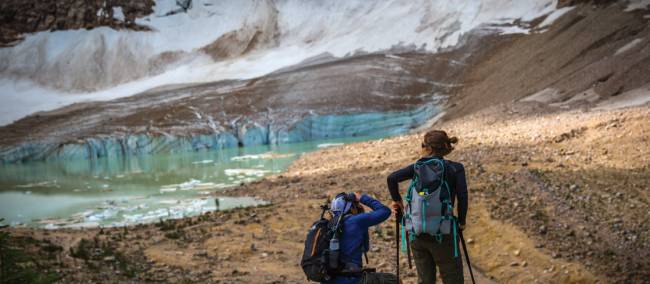
Edith Cavell hike, Alberta | Parks Canada
Blog home / The Impact of Outdoor Adventure on Mental Health
By Robin Esrock
After centuries of being brushed under the proverbial rug, mental health is finally receiving the attention it deserves. Unlike mental illness, mental health is something we all have to manage in our daily lives, referring to our emotions, stress, anxiety, relationships and connections. Yet, as life increasingly winds us up, there is some good news: outdoor activities have been scientifically proven to have a profound and positive impact on our mental health. Let’s dig a little deeper into how outdoor adventure can be both exhilarating and therapeutic.

The pressures of modern life come at us from all directions: work, family obligations, financial responsibilities, political upheaval, and a seemingly endless barrage of negative news. Think of nature as a sanctuary, a safe space to withdraw, retreat, and recalibrate. Outdoor activities such as hiking, cycling, and kayaking immerse us in an environment that operates at an altogether different pace. No hustle, no bustle, no deadlines, pinging messages, appointments, or busy calendars. Your goal is typically to get from A to B, enjoying scenic landscapes along the way.
Scientific research corroborates the stress-relieving effects of outdoor activities and travel in general. The World Travel & Tourism Council did a study showing that 80% of people aged 25 to 70+ reported improved general moods and outlooks on life as a result of travelling. Spending time in nature lowers cortisol levels, our primary stress hormone, reducing feelings of anxiety and tension.

Nature provides a sanctuary from the relentless demands of urban existence. Whether hiking through dense forests, kayaking across serene lakes, or simply basking in the warmth of the sun, being outdoors has a remarkable ability to alleviate stress and promote relaxation. The rhythmic movements associated with hiking or cycling also induce a state of mindfulness, allowing us to focus on the present moment and quiet the mind. Exercise is meditative, resulting in a profound sense of calm and rejuvenation.
Doom scrolling is a modern phenomenon with a horrendous impact. We’ve become addicted to information, thumbing through various news apps and fueling our fears with articles about what might or could happen instead of what does. The media operates on a founding principle of ‘if it bleeds, it leads’ because we’re biologically wired to pay more attention to bad news than good news. Bad news leads to more clicks, eyeballs and revenue, incentivizing a negative view of the world and what’s happening in it. Putting yourself in nature can turn off the 24-hour news cycle to focus on the beauty around you and the task at hand. You can’t hike or bike looking at a screen even if you have a cell signal. Outdoor adventure insists you take a break, improving your outlook while recalibrating your attention.

Beyond its capacity to alleviate stress, immersing oneself in nature has been shown to trigger the release of endorphins, neurotransmitters commonly referred to as the body's "feel-good" chemicals. These endorphins evoke sensations of euphoria and contentment, elevating mood and fostering a sense of well-being. Couple this with spectacular coastal or mountain scenery, a wildlife encounter, a dense forest, or a big sky sunrise, and it’s no wonder people get addicted to that all-natural outdoorsy high. It’s one of the reasons why studies have repeatedly demonstrated a strong correlation between time spent in nature and increased levels of happiness and life satisfaction.
Beyond the physical challenge, outdoor adventure is also a journey of self-discovery and personal growth. It requires a certain determination and resilience, as well as the courage and willingness to accept that you might have to transcend your personal comfort zone. All of which are crucial to increasing confidence and improving one’s self-esteem. Any adventure has the power to help us overcome the personal and physical boundaries that stand in our way. Along with it comes a true sense of accomplishment, reinforcing a positive self-image and showing us exactly what we can achieve at any age or fitness level. I can’t overemphasize just how good it feels to conquer a great hike or ride, especially when it is accompanied by a remote beauty few get to experience. From a mental health perspective, we become more resilient, confident, and grateful for the opportunities.

Whether you’re a hardcore hiker or casual day walker, choosing an outdoor adventure benefits your body, mind, and spirit in equal measure. Physically, we improve our cardiovascular health, strengthen our muscles, and improve our overall fitness levels. Mentally, we navigate new terrain, sharpen our focus, and meditate in the quiet, unhurried pace of nature. It’s an opportunity for self-reflection, spiritual renewal, awe and wonder at a world that exists beyond rush hour and packed schedules. Simply reconnecting to the earth, sky, mountains, and seas is a powerful and all-natural prescription to the stresses of modern society.
Robin Esrock is the bestselling author of the Great Canadian Bucket List and the Great Canadian Trails ambassador.